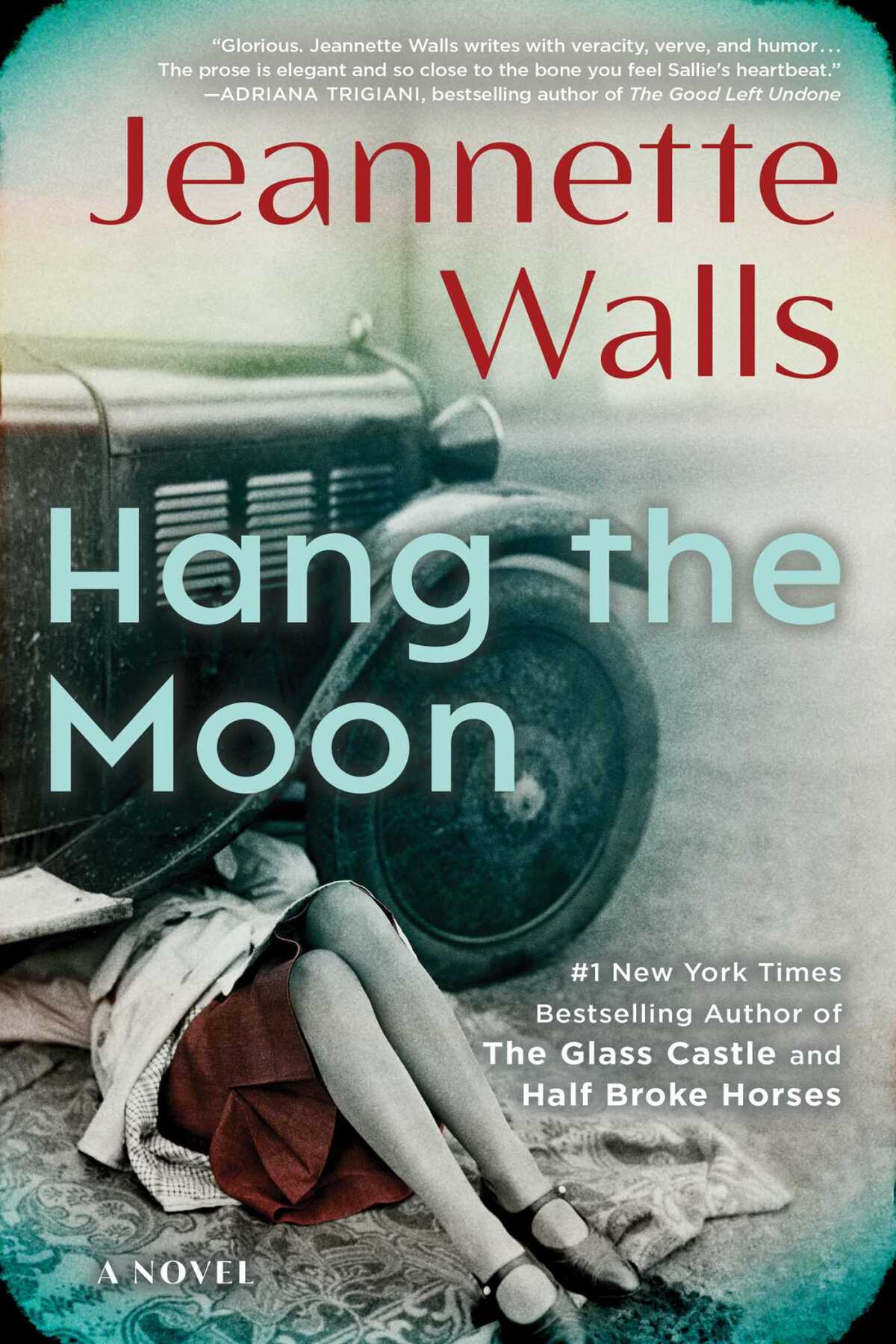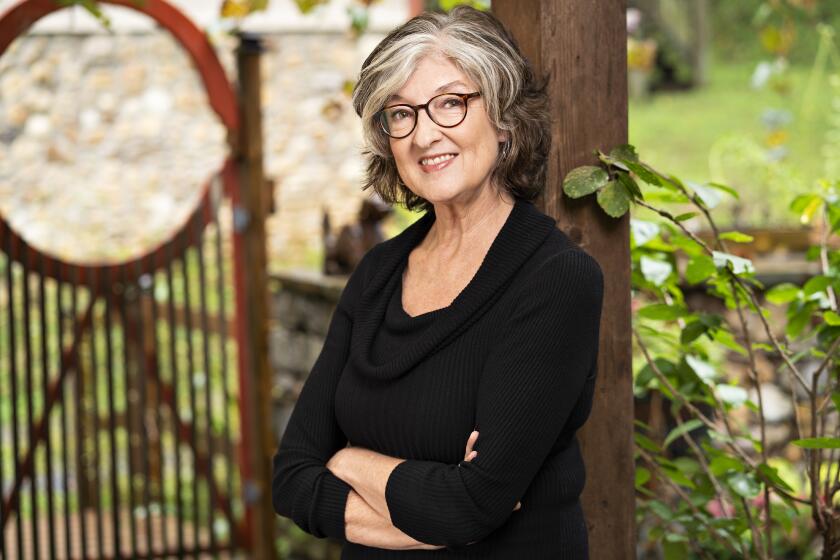What’s Henry VIII doing in 1920s Virginia? He’s in Jeannette Walls’ wild new novel

- Share via
Review
Hang the Moon
By Jeannette Walls
Scribner: 368 pages, $28
If you buy books linked on our site, The Times may earn a commission from Bookshop.org, whose fees support independent bookstores.
When a book has a big conceit I want it to be completely obvious, or at least completely seamless. Jeannette Walls’ latest novel, “Hang the Moon,” definitely succeeds in seamlessness, its narrative of Roaring ’20s country life roller-coastering along. But the novel becomes more intriguing once you know its rural Virginian petty dynasts correspond to the Tudors at the height of British rule. Duke Kincaid, always known as “the Duke,” his several wives and their assorted children and hangers-on could all find places at Hampton Court Palace, or perhaps within Hilary Mantel’s brutal “Wolf Hall” trilogy.
Although the Duke has controlled Claiborne County for decades, meting out justice and punishment with a flick of his finger, the novel focuses on his daughter Sallie, a redheaded dead ringer for Queen Elizabeth I. From her childhood exile to her adolescent angst over her brother Eddie (poor Edward I), her young-adult escapades and the inevitable war for power, Sallie battles forces out of her control until learning that gaining control is the fastest way out of an existence rife with poverty, ignorance, crime and hatred. Yet, as with her royal analogue, Sallie’s greatest threats reside within her own family.
The “Poisonwood Bible” author on her career and her new novel, “Demon Copperhead,” which reboots “David Copperfield” in opioid-ravaged Appalachia.
For years Sallie was cut off from her father and his kin, sent to live with her Aunt Faye, who Sallie believes subsists on taking in laundry. In the nine years she spends helping Faye scrub bloody sheets, Sallie hopes for a return to the big house, where the Duke now lives with his wife Jane, son Eddie and housekeeper Nelly. His faithful retainer, Cecil Dunbar (does the name help you connect the dots?), is ever ready to help the Duke preside over regular sessions at the family’s Emporium, where county inhabitants arrive as supplicants to pay rent, offer bribes or beg for leniency.

Why conflate early Renaissance aristocrats with early 20th century bootleggers? For one thing, it tracks: Every society has its rulers, whether they’re overprivileged nobles or First Families of Virginia — both groups expecting the peasants to bow and scrape before their money and power.
But Walls, whose memoir, “The Glass Castle,” and two previous novels all shine a light on underserved American communities, seems determined here to show how even privileged women struggle to be free. “The Glass Castle” broke new ground in memoir and remains a primary text for writers confronting family dysfunction; Walls’ subsequent fiction also dealt with her own past. “Hang the Moon” might strike some as a significant departure, but it still feels of a piece with her more personal excavations of rural lives, with the aperture opened up to different classes and histories.
Sallie is no less trapped in the system than the poorer folk in Claiborne County. When the family descends into chaos after Duke’s death, she notes, “it dawns on me that this is what happens when you lose your center, the sun that everyone else circles around.”
“Don’t let Hollywood get its hands on your story,” a writer friend advised me.
At first it seems that Sallie’s rise will bring about great social change, maybe even social justice: When she learns that the theft of moonshine from a local Black family will put them in arrears, she vows to make sure all of the still owners will get a fair price for their whiskey. But soon enough, Sallie has taken to border-crossing, booze-toting night runs like a young Tony Soprano adding up the day’s take at the Bada Bing!
“I don’t for one second forget that what we are doing is illegal, but legal and illegal and right and wrong don’t always line up,” she opines. “Ask a former slave. Plenty of them still around. Sometimes the so-called law is nothing but the haves telling the have-nots to stay in their place.”
This strain of rationalization feels familiar because it is universal: It’s how power corrupts and how the powerful sleep at night. One of the sharpest points Walls makes in this retelling of a famous dynasty’s rise and fall and rise is that there will be blood, and it will likely flow from the very people the dynasty claims to champion.
Speaking of blood, remember Queen “Bloody Mary”? Her counterpart is Mary Kincaid Canon, Sallie’s much older half sister, married to a glibly pious Episcopal priest and herself a devoted Christian, who wants nothing less than to clean up Claiborne County from the scourge of moonshine and nothing more than to become a mother. While to say more might threaten spoilers, it’s more fascinating to see how much Sallie and Mary sympathize with each other, to think of how a twist of fate might have led them to cooperate in a matriarchal dynasty.
Maggie O’Farrell uses scant material on the Bard’s family tragedy to examine the struggles of his wife in a beautiful new novel, “Hamnet.”
Perhaps Sallie, by the book’s end battered by multiple slings and arrows (to quote Elizabeth I’s favorite bard), will forge a new road – for herself and her new femme-forward ménage, including an unexpected sibling and an unexpected ward. Unlike the men in her life — the Duke; a suitor named Rawley (geddit); Cecil Dunbar’s son Tom — Sallie has a different perspective and a wealth of experience to bear on a world in which Prohibition will soon give way to the Great Depression.
Most of us who have forgotten Mary Tudor haven’t forgotten her sister Elizabeth’s long reign, lonely personal life and inability to advance her bloodline. Walls certainly hasn’t, but in order to find out the author’s vision for how Sallie Kincaid will guide her community forward, you’ll have to read the author’s smart, energetic and cleverly revisionist novel for yourself.
Patrick is a freelance critic, podcaster and author of the forthcoming memoir ”Life B.”
More to Read
Sign up for our Book Club newsletter
Get the latest news, events and more from the Los Angeles Times Book Club, and help us get L.A. reading and talking.
You may occasionally receive promotional content from the Los Angeles Times.











